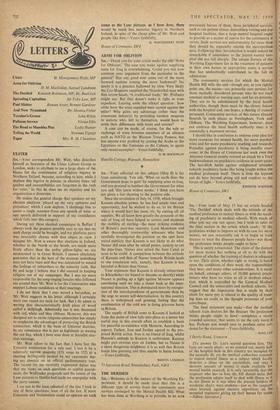SIR,—Your issue of May 15 has an article headed 'The
Derided' which deals with the attitude of the medical profession to mental illness or with the teach- ing of psychiatry in medical schools. With much of what you say one can agree; but I wish to refer to the final section in the article which reads: 'If the profession wishes to impress us with its case for more money, we can reasonably ask it to begin to train doctors to treat the diseases people have—not those the profession thinks people ought to have.'
This is surely nonsensical. The claim of the doctors for more money has nothing at all to do with the question of whether the training of doctors is adequate or not. Their claim, whether right or wrong, is based upon the conditions of their work, the responsibility they bear, and many other considerations. It is made on behalf, amongst others, of 20,000 general practi- tioners who have no voice at all in medical educa- tion, which is controlled by the General Medical Council and the universities and medical schools. To suggest that the impression that is made by their claim for more pay is related to the quality of train- ing does no credit to the thought processes of your,' contributor.
The final statement you make—that the medical schools train doctors for the diseases 'the profession!! thinks people ought to have'—completes a nicely rounded sentence; that seems to me the only merit it has. Perhaps you would care to produce some evi- dence for the statement.—Yours faithfully, [To answer Dr. Lee's second question first. The facts are surely plain : as we pointed out, nearly half of the hospital beds in this country are occupied by the mentally ill; yet the medical authorities continue to regard mental illness as a subject which hardly deserves a place on the curriculum; and only a derisory amount of money is made available for mental health research. It is only reasonable that the taxpayer who has to foot the bill should insist that the profession adapts itself to deal with illness as it is, not illness as it was when the present holders of academic chairs were students—just as the taxpayer once insisted, against massive opposition, on the+ mounted regiments giving up their horses for tan —Editor, Spectator.]






































 Previous page
Previous page